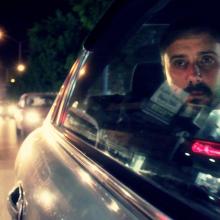dirty wars

Political mural in Buenos Aires commemorating the Dirty War. Image via Carsten ten Brink/Flickr
Many have accused the Catholic Church of being complicit in the government-sanctioned violence, and the Argentinian Pope Francis has been criticized for being silent in the face of such atrocity. But today’s statement says the decision to release the archives came at the pope’s direction.
The move is noteworthy, given that many of the records would traditionally never be made public, while others would not typically be released for decades. The break with tradition, according to the statement, comes “in the service of truth, justice and peace.”
Days before President Barack Obama's high-profile speech on drones and U.S. counterterrorism efforts, Sojourners sat down with investigative reporter Jeremy Scahill to take an inside look at U.S.-led covert wars and the drones that have become an integral part of our global “war on terror.”
His thesis?
"After years of traveling in these countries, I really believe that we’re creating more enemies than we’re killing.”
In some respects, drones are simply a new tool of old empire. Scahill, author of Dirty Wars: The World is a Battlefield and producer of the documentary of the same name, now in theaters, calls this an "unending war ... being legitimized under a popular Democratic president, who is a constitutional lawyer by trade.”
Indeed, within five years, the Bush administration's invasion of Iraq for terrorist attacks the country did not commit has transformed under the Obama administration into pre-emptive assassinations halfway around the world, for crimes citizens have not yet committed. The result, Scahill suggested, is our collective complicity to “unending war.”
In 1985 and 1986, the U.S. government spent an estimated $2 million to prosecute 11 church workers for offering sanctuary to refugees from the U.S.'s "dirty wars" in Central America. After a trial in which defense attorneys were not allowed to introduce evidence of the refugees' or defendants' motives or information on the 1980 Refugee Act, eight defendants were convicted. —The Editors
What is a registered Republican who voted for Ronald Reagan in 1980 doing in the sanctuary movement? Living out her faith and doing what has to be done, says Kay Kelly, the 62-year-old widow and grandmother who was put under house arrest for her refusal to testify as a government witness in the sanctuary trial.
"I was not a political activist looking for a cause," Kelly says, explaining how she got involved in refugee work. "But when you see these people coming in and you hear their stories...to me it's just the thing to do. All through life I've been taught that you love your neighbor as yourself, you help them, you do whatever is necessary."
Kelly began attending Southside Presbyterian Church with her husband and mother in 1981, shortly before the congregation voted to make the church a public sanctuary. After both her husband and mother died and she had been forced into early retirement from her job at the University of Arizona library—all during the last eight months of 1983—Kelly told Rev. John Fife that she needed something to do. In January 1984 she began working with refugees.
